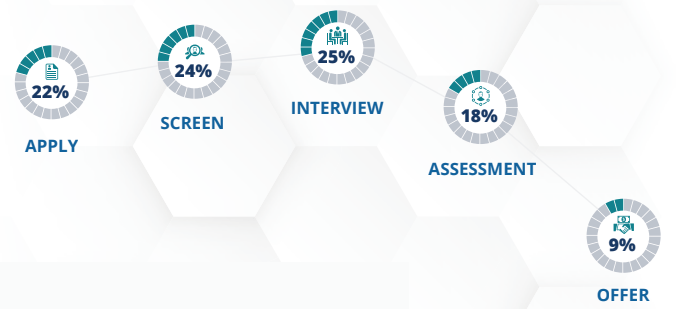Background screening is crucial to every organization’s hiring process. According to a recent study conducted by Aptitude Research and Verified First, companies that leverage technology like background screening are three times more likely to improve their quality of hire. While organizations understand pre-employment background checks are crucial, 39% of employers do not screen for every job. This gap in the hiring process can lead to higher turnover rates and increased costs associated with rehiring.
If you’re looking to close gaps in your hiring process, it’s time to consider background checks as part of your strategy. In this article, we will discuss the importance of employee background screening in the hiring process. We’ll look at what pre-employment background checks consist of for recruiters and human resources departments. We will also discuss how background screening can help recruiters make better hiring decisions that benefit an organization’s bottom line.
What Pre-Employment Background Checks Consist of
A pre-employment background check can include many different components depending on the industry and job role. It’s vital to conduct a background check on all job applicants, especially if they are hired for safety-sensitive or high-risk positions. Here are the different searches an employer can order to check on a potential candidate:
Criminal Record Checks
- County and state administrative courts
- Departments of corrections
- Third-party sex offender databases
Checking court records for potential criminal backgrounds is essential to ensuring a candidate is adequately qualified for a job role. This extra step protects not only your business but also any customers or other individuals who may interact with the potential employee.
Drug Screening
Drug screenings can be part of the pre-employment screening process, although they are not required for private employers. They are necessary for industries like transportation, safety, hospitals, and schools, with positions considered high-risk or safety-sensitive. Drug screening is effective at preventing absenteeism, health issues and costs, accidents, and even potential litigation.
Drug testing laws vary by state, so it’s essential to understand the requirements, especially for employers that operate in more than one state. For example, some states require companies to notify applicants of any drug screenings that must be conducted for pre-employment verification purposes as part of the Fair Credit Reporting Act (FCRA).
License Verifications
Some professions require license verifications to ensure a candidate has the appropriate credentials for a position. Unfortunately, applicants have been known to fabricate their resumes. Therefore, validating license verifications is important, especially when 75% of HR professionals have caught a lie on a resume.
Several different types of verifications can be conducted, depending on the position:
Used to verify a candidate’s employment history by contacting their previous employers.
Verifies information required by the Federal Motor Carrier Safety Administration (FMCSA) part 391 for driving positions and DOT 49 CFR part 40 for safety-sensitive positions.
Verifies that a person has received a degree or certification from a college, university, or other educational institution.
References are contacted to verify a candidate’s work ethic and overall character.
Confirms that an individual has a particular license or certification for nurses, doctors, lawyers, pharmacists, insurance agents, and more.
I-9 and E-Verify
Form I-9s are used to verify the identity of citizens and noncitizens hired for employment in the United States. E-Verify is the process used to electronically compare information the employer enters from the I-9 to records available in the Social Security Administration and U.S. Department of Homeland Security.
While E-Verify uses information from a Form I-9, there are differences between their requirements:
Form I-9 | E-Verify |
|---|---|
Is mandatory | Is voluntary for most employers |
Does not require a Social Security number | Requires a Social Security number |
Must be used to reverify expired employment authorization | May not be used to reverify expired employment authorization |
Proper Form I-9 and E-Verify verification is vital to reduce the risk of potential fines and penalties. According to an analysis of 1.5 million paper Form I-9s, 76% have at least one fineable error, and the average paper Form I-9 has 3.1 errors. With U.S. Immigration and Customs Enforcement (ICE) fines costing as much as $2,332 per substantive Form I-9 error, this can add up significantly.
Civil Records
Searches a specified county to identify non-criminal suits filed by individuals or corporations, such as product-liability suits, local civil-rights violations, and judgments for nonpayment of goods.
As most states divide their lower and upper courts based on the monetary amount of the claim, this search accesses records for cases assigned to and processed in lower and upper courts.
Driving Records
This type of search checks information provided by a state’s Department of Motor Vehicles (DMV), including license class and status, convictions, violations and infractions, and more. Driving record searches are common for applicants when a position requires operating a vehicle. A driver record search may include:
- Motor vehicles record
- Commercial driver's license (CDL)
- DOT employment verification
- Pre-employment Screen Program (PSP) crash and inspection history
- FMCSA clearinghouse
Identity Checks
Identity checks can increase the accuracy of other reports and checks. This type of search can include a social security address trace, which reveals whether the social security number (SSN) provided is part of the numbering sequence used by the government.
This search also includes data from numerous sources to obtain past addresses. It’s important to note that identity searches cannot be used by themselves as the basis for employment decisions.
Why Employment Screening is Important
According to a survey conducted by Aptitude Research and Verified First, 41% of companies are increasing their headcounts this year, and one in three do not have the right data to make hiring decisions. Background checks ensure organizations have accurate information about candidates and bring value to the quality of hires.
Employers that invest in background screening solutions see an improvement in their candidate experience and the retention of quality employees. Let’s examine why employment screening is important and how it can positively impact your organization.
Reduce Costs of a Bad Hire
Resource Management (SHRM). However, it takes six to nine months of an employee’s salary to replace that same employee if they leave the company. For an employee that makes $60,000 per year, recruiting and training costs $30,000-$45,000 on average. As you can see, the cost of one bad hire is staggering.
Incorporating background screening into your hiring processes reduces the costs associated with bad hires. You can identify potential bad hires before they become employees, saving your organization time and money associated with:- Recruitment fees and staff time
- Training time and fees for the bad hires
- Relocation and training fees for replacement hires
- The negative impact on team performance
- The disruption to incomplete projects
- Lost customers
$30,000-$45,000
Improve the Candidate Experience
The background check process also significantly impacts the candidate experience. Most background screens happen while hiring decisions are made. This is a critical point in the hiring process when inaccurate information or delays can result in the loss of candidates.

Candidates Dropping Off During the Hiring Process – Source: Aptitude Research and Verified First
An automated employment screening process can help foster a more positive candidate experience. Accurate information is collected, and hiring managers can make more informed decisions in a quicker amount of time. Applicants receive a fair process when background screenings are used, and human decision-making is reduced.
Maintain Hiring Compliance
- FCRA: The Fair Credit Reporting Act states that an employer must get an applicant’s written permission before running a background check. The candidate has the right to say no, but the employer has the right not to extend a job offer.
- EEOC: The Equal Employment Opportunity Commission is responsible for enforcing federal laws that make it illegal to discriminate against a job applicant or an employee because of a person’s race, color, religion, sex, national origin, age, disability, or genetic information.
- Ban the Box: Several states, cities, and counties nationwide have adopted “ban the box” so that employers consider a job candidate’s qualifications first, without the stigma of a conviction or arrest record.
Increase Productivity for Hiring Managers
Background checks can also increase recruiter efficiency by reducing time to fill, automating the employment screening process, and even integrating with an applicant tracking system (ATS). Hiring managers can see significant productivity gains by partnering with a background screening provider that streamlines workflows: Automating the background check process allows organizations to:
- Fast-track top candidates and improve their time to fill.
- Saves recruiters time in their days with accurate, thorough results and quick turnaround times.
- Integrate background screening tools with their recruiting and onboarding software to recruit, interview, screen, hire, and onboard in a single system.
Strengthen the Quality of Hires
With the drastic shift in the job market, businesses must maintain a competitive advantage so they can attract select candidates. Those top applicants turn into quality hires, which can dramatically improve an organization’s retention rate and lower costs associated with turnover.
By leveraging employment screenings, hiring managers can identify quality hires by detecting candidates who have previously committed workplace fraud, verifying an applicant’s identity, validating credentials, and more. Recruiters can make knowledgeable hiring decisions based on accurate data and strengthen the quality of their hires.
How to Choose a Background Check Service
1. Determine Your Screening Needs
2. Evaluate Screening Provider Options
3. Consider the Candidate's Experience
4. Calculate Return on Investment
Before you invest in any technology platform, consider the ROI for your organization. Review the costs and benefits of the solution to ensure it’s a sound investment.

Want to Calculate Your ROI?
Bonus Tip: Integrate Your Hiring and Screening Solutions
- Utilize texting, proactive alerts, and a browser extension, all designed to cut your time to hire.
- Improve your costs with access to screens like criminal background checks and education verifications.
- With their SHRM and PBSA-certified team, you can feel confident you're making the best hiring decisions with the most accurate background checks.
With the seamless integration between APS Hire and Verified First, you can reduce your time to fill, improve your hiring costs, and increase your quality of hire for a more efficient hiring process. Talk with a background specialist about your screening needs today.



